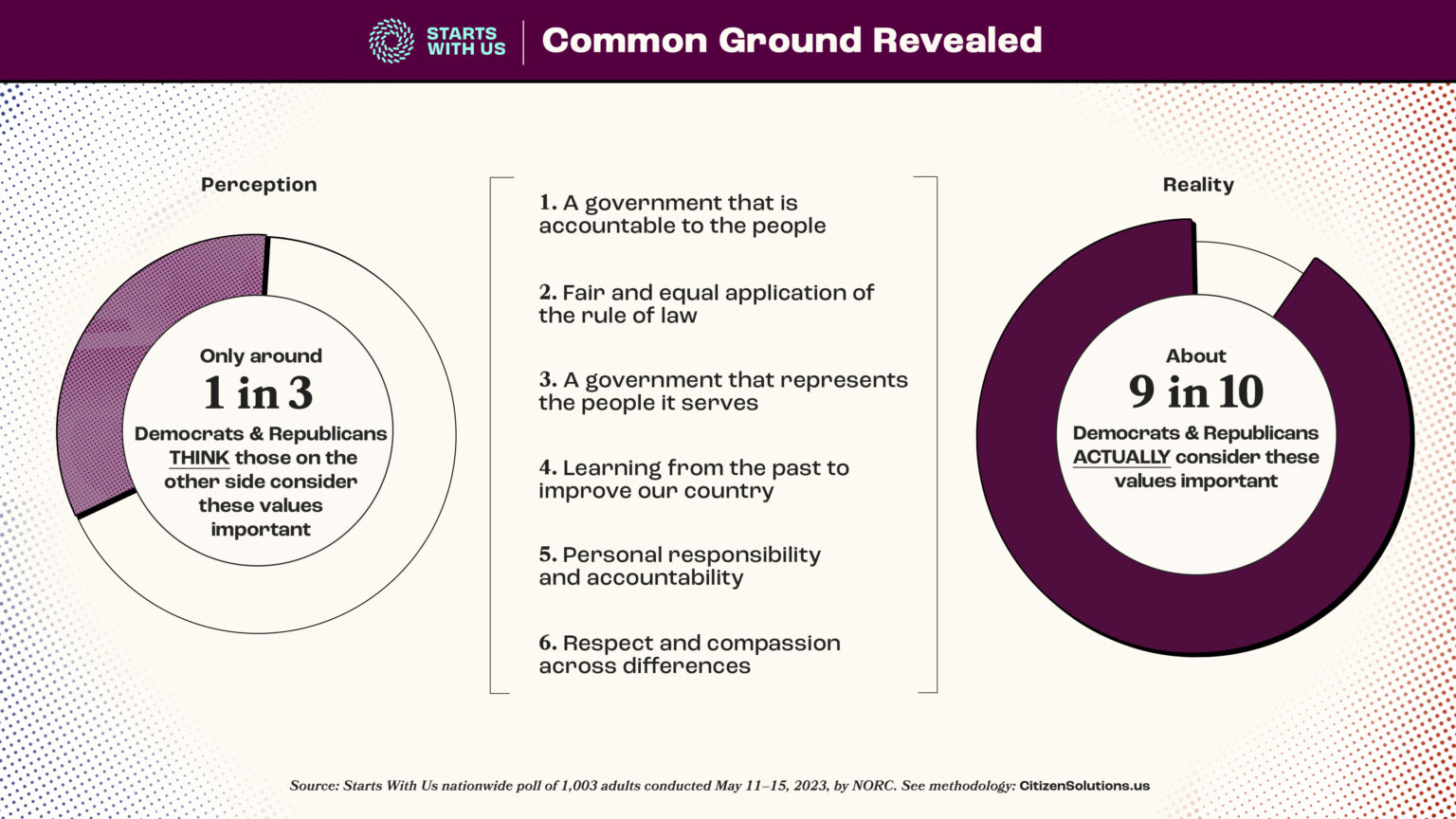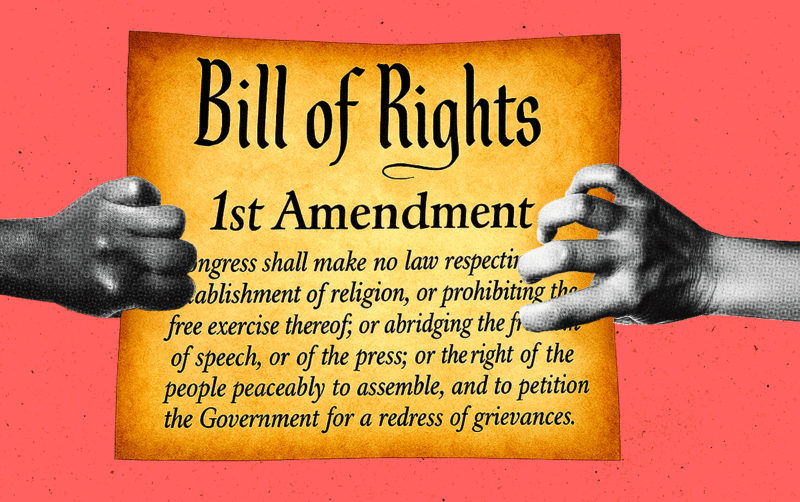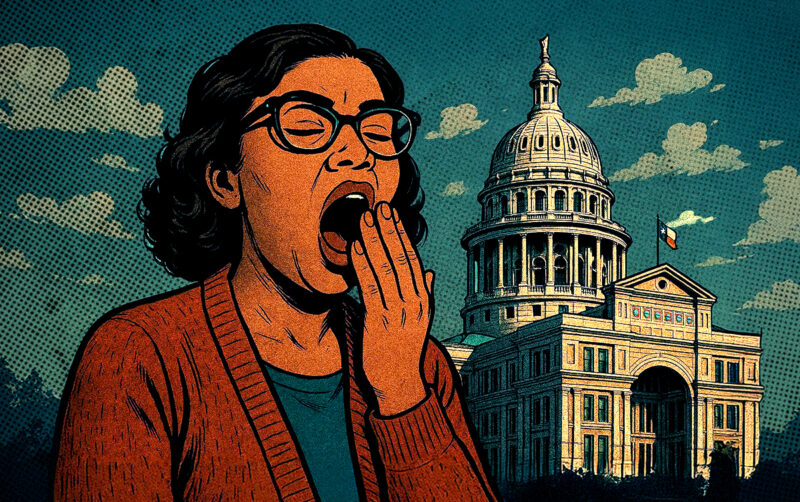Editorial
6 Surprising Beliefs Democrats and Republicans Share
There are six core values that almost all Americans, regardless of political party, still believe in. But here’s the catch: most of us think the other side doesn’t care about these values.
Spend five minutes on cable news and you’ll walk away thinking America’s political divide is less of a “gap” and more of a “Grand Canyon with sharks at the bottom.” We’ve turned each other into caricatures: cartoonishly evil, hopelessly naive, or maybe both.
The irony is that underneath the shouting, Americans agree on a surprising number of fundamental values. Our original polling found that approximately 9 in 10 Democrats and Republicans believe in things like government accountability and respect across differences.
The kicker? Only around 1 in 3 Democrats and Republicans think the other side sees those values as important.
If we can spot that common ground, it’s a lot harder to buy into the “us vs. them” narrative that keeps us locked in a political shouting match.
So let’s look at the six bedrock values most of us share — and some moments when the country actually lived up to them.

1. A Government That Is Accountable to the People
The whole point of a representative democracy is that the people are the boss. It’s not “The government knows best,” rather it’s “The government works for us.” That means transparency, checks and balances, and consequences when leaders cross the line.
In the early ’70s, Richard Nixon’s White House learned that the hard way. The Watergate scandal started as a botched break-in to gather dirt on political opponents, but it snowballed into a bipartisan investigation that exposed obstruction of justice at the highest level. Democrat Sam Ervin and Republican Howard Baker led the Senate Watergate Committee together, asking the questions that cut through the spin. When the “smoking gun” tape revealed Nixon’s role in the cover-up, Republican leaders told him he’d be impeached if he stayed. He resigned — the only U.S. president ever to do so.
That’s the system working. The parties may fight tooth and nail on almost everything else, but when the evidence was undeniable, they agreed the president answers to the people, not the other way around.
2. Fair and Equal Application of the Rule of Law
If laws only apply to some people, they’re not laws — they’re just privileges with a dress code. The idea that everyone, no matter their race, wealth, or political connections, should be held to the same legal standard is a cornerstone of American identity.
The Civil Rights Movement forced the nation to face the gap between that ideal and reality. Through protests, legal challenges, and relentless advocacy, it led to the strongly bipartisan Civil Rights Act of 1964, which made discrimination based on race, color, religion, sex, or national origin illegal, making equal treatment a legal standard nationwide.
Most Americans still believe in that principle. We may argue endlessly about whether the justice system is living up to it. But the belief that it should is shared across the spectrum.
3. A Government That Represents the People It Serves
A representative government doesn’t just exist to pass laws. It’s supposed to address the actual needs of its citizens. That means crafting policies that make a tangible difference in people’s lives, not just catering to donors or party insiders.
In 1965, lawmakers from both sides came together to create Medicare and Medicaid, making it clear that government exists to meet the needs of its people — not just to protect the interests of the powerful. By guaranteeing healthcare for seniors, low-income families, and people with disabilities, these programs showed what it looks like when policy is designed to serve the public first.
Decades later, Americans still expect their government to serve them, not act as a gated community for the well-connected.
4. Learning from the Past to Improve Our Country
If we’re smart, history isn’t just a list of old mistakes. It’s a manual for not making them again. Learning from the past means looking honestly at what worked, what failed, and why.
After World War II, the U.S. could’ve walked away from a ruined Europe. Instead, leaders from both parties backed the Marshall Plan, a massive effort to rebuild economies, stabilize governments, and prevent the chaos that can lead to another global war. It strengthened alliances and boosted prosperity on both sides of the Atlantic.
It’s proof that using history as a guide isn’t nostalgia — it’s strategy. And most Americans agree that we ignore those lessons at our own peril.
5. Personal Responsibility and Accountability
The principle of personal responsibility unites Americans across the political spectrum. Whether you frame it as “pulling your own weight” or “owning your mistakes,” it’s the idea that actions have consequences — and that people should have a chance to make things right.
In 2018, Congress passed the First Step Act with overwhelming bipartisan support. It reduced certain mandatory minimum sentences for nonviolent crimes, expanded rehabilitation programs, and rewarded inmates who demonstrated good behavior. The law struck a balance: hold people accountable, but also give them a pathway to redemption.
That combination — responsibility and opportunity — is something both sides can get behind.
6. Respect and Compassion Across Differences
Respect and compassion across differences means treating people with dignity and understanding even when you disagree on political or ideological issues.
We like to think politics is the ultimate dividing line, but when disaster strikes, it usually disappears. In the wake of hurricanes, wildfires, or floods, people don’t ask how you voted before lending a hand. Communities rally, strangers show up, and the focus shifts to survival and rebuilding. The recent wildfires in LA and the Texas Hill Country floods are a good example of this, with both governors committing resources to support.
That spirit sometimes even sneaks into Washington. Lawmakers from opposing parties routinely join forces on disaster relief bills, from funding recovery efforts to giving states flexibility on tax deadlines after emergencies. It’s a reminder that compassion isn’t a partisan monopoly.
When people’s homes are gone and lives are upended, empathy tends to outrun politics — and that’s something most Americans agree should happen more often.
The Bottom Line
For all the noise, Americans still share some big, foundational values: a government that works for the people, equal justice under the law, meeting real needs, learning from the past, taking responsibility, and treating others with respect. We’ve proven we can act on these values when it counts — sometimes in the most politically unlikely moments.
The divide isn’t as much about the values themselves as it is about the stories we tell about “the other side.” Change the story, and maybe we change the outcome. We’ve done it before. We can do it again.
— Alex Buscemi (abuscemi@buildersmovement.org)
Keep Reading

The Free Speech Double Standard

5 Texas Issues Everyone Ignores—But Shouldn’t
